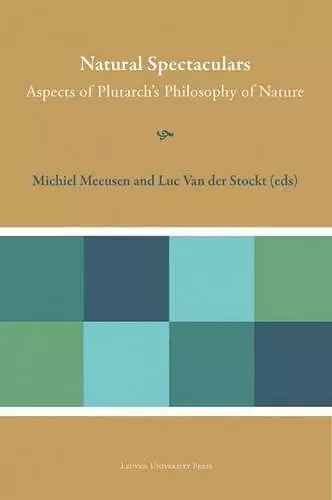Natural Spectaculars
Aspects of Plutarch's Philosophy of Nature
Michiel Meeusen editor Luc Van der Stockt editor
Format:Hardback
Publisher:Leuven University Press
Published:17th Nov '15
Currently unavailable, and unfortunately no date known when it will be back

The value of Plutarch’s perception of physical reality and his attitude towards the natural spectacle. Plutarch was very interested in the natural world around him, not only in terms of its elementary composition and physical processes, but also with respect to its providential ordering and ‘wonders’. His writings teach us a lot about his perception of physical reality and about his attitude to the natural spectacle. He found his greatest inspiration in the ontological and epistemological framework of Plato’s Timaeus, but a wide range of other authors were also of seminal interest to his project. Clearly, the highly literary value of Plutarch’s natural philosophical writings should not be underrated. It is therefore not surprising that recently scholars have started to reassess the ancient scientific value of Plutarch’s natural philosophical writings. Natural Spectaculars aims to give further impetus to this dynamic by treating several aspects of Plutarch’s natural philosophy which have remained unexplored up to now.
This publication is GPRC-labeled (Guaranteed Peer-Reviewed Content).
Contributors: Jan Opsomer (KU Leuven), Suzan Sierksma-Agteres (Rijksuniversiteit Groningen), Angelo Casanova (Università degli Studi di Firenze), Paola Volpe Cacciatore (Università degli Studi di Salerno), Aldo Setaioli (Università degli Studi di Perugia), Fabio Tanga (Università degli Studi di Salerno), Michiel Meeusen (KU Leuven), Luisa Lesage Gárriga (Universidad de Málaga), Ana Ferreira (Universidade do Porto), Israel Muñoz Gallarte (Universidad de Córdoba), Lautaro Roig Lanzillotta (Rijksuniversiteit Groningen), Bram Demulder (KU Leuven), Aurelio Pérez Jiménez (Universidad de Málaga), Delfim Ferreira Leão (Universidade de Coimbra)
To conclude, this is a volume that significantly advances our understanding of Plutarch as a natural philosopher and scientist, among other things, by doing justice to the different genres of Plutarchan writing that serve as platforms for enquiry into the mechanisms or laws of nature. Scholars and students alike will have much to gain from its contents. Katerina Oikonomopoulou, The Journal of Hellenic Studies, 140, 283-284. doi:10.1017/S0075426920000543
ISBN: 9789462700437
Dimensions: unknown
Weight: 907g
264 pages